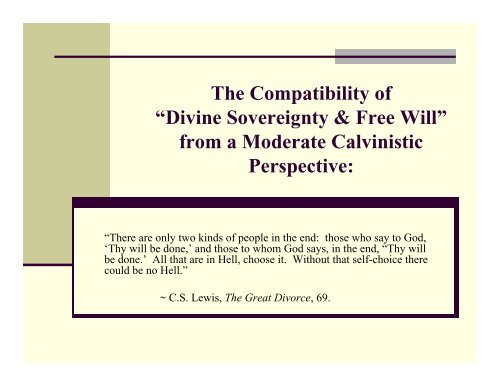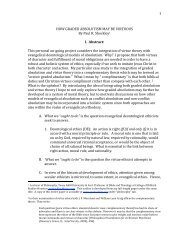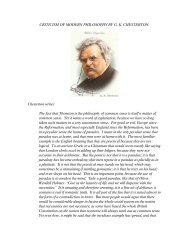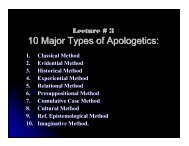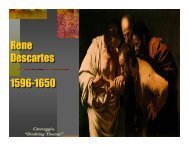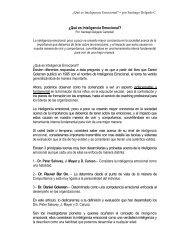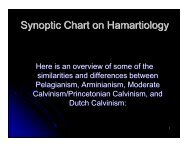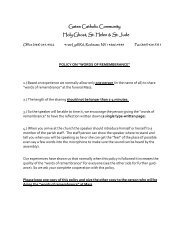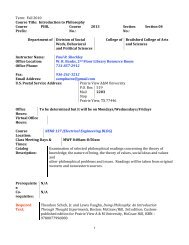The Compatibility of “Divine Sovereignty & Free Will” from a ...
The Compatibility of “Divine Sovereignty & Free Will” from a ...
The Compatibility of “Divine Sovereignty & Free Will” from a ...
You also want an ePaper? Increase the reach of your titles
YUMPU automatically turns print PDFs into web optimized ePapers that Google loves.
<strong>The</strong> <strong>Compatibility</strong> <strong>of</strong><br />
<strong>“Divine</strong> <strong>Sovereignty</strong> & <strong>Free</strong> <strong>Will”</strong><br />
<strong>from</strong> a Moderate Calvinistic<br />
Perspective:<br />
“<strong>The</strong>re are only two kinds <strong>of</strong> people in the end: those who say to God,<br />
‘Thy will be done,’ and those to whom God says, in the end, “Thy will<br />
be done.’ All that are in Hell, choose it. Without that self-choice there<br />
could be no Hell.”<br />
~ C.S. Lewis, <strong>The</strong> Great Divorce, 69.
I. Outline:<br />
I. Consider the Problem:<br />
II.<br />
Consider two Extreme Solutions:<br />
A. Fatalism: human action is purposively determined,<br />
compelled, or prescribed.<br />
B. Universalism: All people, regardless, will be saved.<br />
III.<br />
IV.<br />
Consider a solution: Moderate Calvinism:<br />
A Proper Starting Point: Actuality/Simplicity <strong>of</strong> the Essence <strong>of</strong><br />
God:<br />
V. Additional Considerations:<br />
VI.<br />
Conclusion
I. Consider the Problem:<br />
If God is all-powerful, then He could save all<br />
persons.<br />
If God is all-loving, then He would save all<br />
persons.<br />
Not all people are saved.<br />
He must not be all-loving or all-powerful, or<br />
both.
II: Extreme Solutions:<br />
Though well-meaning both fatalists &<br />
universalists fail to heed the<br />
actuality/simplicity <strong>of</strong> God as their<br />
starting point for salvation:<br />
If an all-powerful God can save all, but He will not<br />
save all, then God is not all-loving. For a God<br />
who is all-loving would save all, if He could save<br />
all. On the other hand, if God is all-loving and<br />
all-powerful, then all will be saved.
A. Extreme Solution: Fatalism<br />
Human action is purposively determined, compelled, or prescribed by God.<br />
God is all-powerful;<br />
God will not save all persons (Predestination; Double<br />
Predestination; Preterition; Fatalism);<br />
<strong>The</strong>refore, God is not all-loving.<br />
1. If an all-powerful God can save all, but He will not save all, then<br />
God is not all-loving. For a God who is all-loving would<br />
save all, if He could save all.<br />
2. Fatalists are faced with the problem that God does not love<br />
everybody because He only died for the elect [<strong>The</strong>y tend to<br />
interpret to “world” as “elect” who live throughout the world<br />
(John 3:16)]. Hence, unconditional election, limited atonement,<br />
irresistibility, & perseverance <strong>of</strong> the saints.<br />
3. It becomes even more problematic if they affirm double<br />
predestination over preterition (passing over the non-elect).
B. Extreme Solution: Universalism<br />
God is all-powerful; thus He can save all.<br />
God is all-loving; He would save all.<br />
<strong>The</strong>refore, God will save everyone.
B. Four Basic Types <strong>of</strong> Universalism:<br />
1. Universal Reconciliation: This view contends that Christ’s<br />
death accomplished its purpose <strong>of</strong> reconciling all mankind to<br />
God. Whatever separation exists between man & the benefits<br />
<strong>of</strong> God’s grace is subjective in nature, existing only in man’s<br />
mind. Reconciliation is an accomplished fact<br />
2. Universal Pardon: This view contends that God, being<br />
loving, will not hold unswervingly to the conditions he has<br />
laid down. Though threatening eternal punishment he will in<br />
the end relent & forgive everyone. God will treat all persons if<br />
they had believed.
B. Four Basic Types <strong>of</strong> Universalism:<br />
3. Universal Restoration: This view contends that at some<br />
point in the future all things will be restored to their original<br />
and intended state. Full salvation may be preceded by cycles<br />
<strong>of</strong> reincarnation or by some purgatorial period at the beginning<br />
<strong>of</strong> the life hereafter.<br />
4. <strong>The</strong> Doctrine <strong>of</strong> a Second Chance: <strong>The</strong> work <strong>of</strong> Christ is<br />
sufficient to secure the salvation <strong>of</strong> the elect, but salvation is<br />
effectually secured by the means <strong>of</strong> faith (Rom. 10:10-13). All<br />
people, even those who have heard and rejected, will be<br />
confronted with the claims <strong>of</strong> Christ in the life to come.<br />
Everyone given such an opportunity will <strong>of</strong> course accept.
B. Extreme Solution: Universalism<br />
God is all-powerful; thus He can save all.<br />
God is all-loving; He would save all.<br />
<strong>The</strong>refore, God will save everyone.<br />
Response:<br />
1. We know clearly <strong>from</strong> Scripture that this is not the case for some<br />
humans (body and soul), Satan, the beast, false prophet, and evil<br />
angels, will be cast into everlasting punishment (Matthew 5:30;<br />
10:28; 18:9; Rev. 20:15).<br />
2. Those people who will face eternal punishment are there for their<br />
rejection <strong>of</strong> Jesus Christ (John 3:16) as Savior.<br />
3. <strong>The</strong> effects <strong>of</strong> eternal punishment, which is both a place and state,<br />
include everlasting separation <strong>from</strong> God and His glory (2 <strong>The</strong>ss.<br />
1:9), different degrees <strong>of</strong> punishment (Matt. 11:21-24; Luke 12:47-<br />
48), and that this punishment will be eternal.<br />
4. <strong>The</strong>re will be no second chance for redemption (Isa. 66:24; Mark<br />
9:44-48; Matt. 25:46; 2 <strong>The</strong>ss. 1:9).
III. Resolution to the Problem: Moderate Calvinism:<br />
<br />
One way to avoid this “dilemma” is to say the following:<br />
1. God is a simple indivisible Being (He is not compartmentalized), the sumtotal<br />
<strong>of</strong> His infinite perfections. <strong>The</strong>se perfections include the following:<br />
a. God is all-powerful.<br />
b. God is all-loving.<br />
c. God is all-just.<br />
d. God is all-good, etc.<br />
4. God gave free will to His creatures.<br />
5. It is impossible to force free creatures to act contrary to their freedom<br />
(otherwise it is not free will).<br />
6. <strong>The</strong> sole human condition for salvation is to receive or believe. (Romans<br />
5:1; John 3:16; Acts 16:31; Heb. 11:6).<br />
7. Divine election is unconditional <strong>from</strong> God’s standpoint (Rom. 8:28-29;<br />
Eph. 1:4-5; 2 <strong>The</strong>ss. 2:13).<br />
Salvation is an unconditional gift <strong>from</strong> God that is conditioned on act <strong>of</strong> faith on<br />
our part.
IV. God is a Simple Being:<br />
We must first consider the Person <strong>of</strong> God before we proceed to examine<br />
the activities <strong>of</strong> God:<br />
1. Whatever God fore-chooses cannot be based on what<br />
He fore-knows.<br />
2. Nor can what He foreknows be based on what He<br />
fore-chose.<br />
3. Both must be simultaneous, eternal, and coordinate acts<br />
<strong>of</strong> God (pure actuality/divine simplicity; God cannot be<br />
compartmentalized nor divided).<br />
4. <strong>The</strong>refore, our actions are truly free, and God<br />
determined that they would be such.<br />
God is totally sovereign in the sense <strong>of</strong> actually determining what<br />
occurs, and yet every person is completely free and responsible<br />
for what he or she chooses.
IV. God is a Simple Being:<br />
1 Peter 1:2 states:<br />
“elect according to the fore-knowledge <strong>of</strong> God the Father,<br />
in sanctification <strong>of</strong> the Spirit, for obedience and sprinkling<br />
<strong>of</strong> the blood <strong>of</strong> Jesus Christ.”<br />
As Drs. Chafer and Walvoord comment:<br />
“… teaches not the logical order <strong>of</strong> election in relation to<br />
foreknowledge but the fact that they are coextensive.”<br />
~ Major Bible <strong>The</strong>mes, rev. ed (Grand Rapids:<br />
Zondervan, 1974), 233.
IV. God is a Simple Being:<br />
<strong>The</strong>refore:<br />
1. All aspects <strong>of</strong> the eternal purpose <strong>of</strong> God are<br />
equally timeless for God is a simple Being whose<br />
perfections/attributes are one with His indivisible<br />
essence.<br />
Thus, foreknowledge and predetermination are one in<br />
God. Whatever God knows, He determines. And<br />
whatever He determines, He knows. God knowingly<br />
determining and determinately knowing <strong>from</strong> all eternity<br />
everything that happens, including all free acts. For if<br />
God is an eternal and simple Being, then His thoughts<br />
must be eternally coordinate and unified.
IV. God is a Simple Being:<br />
1. Whatever God fore-chooses cannot be based on<br />
what He foreknows.<br />
2. Nor can what He foreknows be based on what He<br />
fore-chose.<br />
3. Both must be simultaneous, eternal, and<br />
coordinate acts <strong>of</strong> God.<br />
4. <strong>The</strong>refore, our actions are truly free, and God<br />
determined that they would be such.<br />
God is totally sovereign in the sense <strong>of</strong> actually determining<br />
what occurs, and yet every person is completely free and<br />
responsible for what he or she chooses.
V. Additional Considerations:<br />
1. God’s election is not based on the foreknowledge <strong>of</strong> man’s free<br />
choice.<br />
2. God’s election is not forced (in spite <strong>of</strong> man’s free choice)<br />
otherwise salvation is not based upon the human condition <strong>of</strong><br />
belief:<br />
A. It is not very loving to “force” someone to believe.<br />
B. Certainly God’s omniscience has the capacity to decree salvation that<br />
would not infringe upon free choice; He doesn’t have to resort to<br />
dragging people to salvation apart <strong>from</strong> their will.<br />
3. What God foreknew that “motivated” Him to elect us is never<br />
specifically nor clearly stated in Scripture. However, we can<br />
eliminate any idea that says God needed to learned something<br />
because that would mean that there is something potential about<br />
God; it denies omniscience.
V. Additional Considerations:<br />
4. Though every person since Adam and Eve are born totally<br />
depraved, they still possess the image <strong>of</strong> God (holistic involving<br />
personality, dominion, community, and representation) though that<br />
image is totally, extensively effaced by sin (Genesis 1:26-27; 5:1;<br />
9:6-7; Romans 1-2; Acts 10-11):<br />
A. In their depravity, following their original sin, Adam and<br />
Eve perceived God as He entered into the garden <strong>of</strong><br />
Eden; they heard the sound <strong>of</strong> the Lord and hid<br />
themselves among the trees, and conversed with God;<br />
Pagans in Romans 1 “clearly perceive”, and “stand<br />
unexcused”, “suppressing the truth”, and Cornelius in<br />
Acts 10 desired to please God, praying to God who<br />
heard his prayers (Acts 10:4; 35). Thus, God sent Peter<br />
to Cornelius’ house to preach the Good News <strong>of</strong><br />
salvation.<br />
B. For if people are no longer made in the image <strong>of</strong> God,<br />
why would humans be more highly valued than any<br />
other animal life (Genesis 9:1-18) God also created<br />
them.
V. Additional Considerations:<br />
5. A balanced and theologically coherent/harmonious<br />
perspective must include both sovereignty and free<br />
will since both are clearly stated in Scripture.<br />
6. <strong>The</strong>re is no chronological or logical priority <strong>of</strong><br />
election and foreknowledge otherwise it diminishes<br />
God’s simplicity/actuality.
V. Additional Considerations:<br />
7. God’s foreknowledge and His fore-determination<br />
cannot be separated for God is one indivisible Being.<br />
In Him knowledge and fore-determination are<br />
identical. Hence, He had to predetermine in<br />
accordance with His foreknowledge. And He must<br />
have foreknown in accordance with His<br />
predetermination.
V. Additional Considerations:<br />
8. Those who insist that God’s will cannot be resisted confuse what<br />
God wills unconditionally with what He wills conditionally. God<br />
wills the salvation <strong>of</strong> all persons conditionally-conditioned on their<br />
belief (2 Peter 3:9):<br />
A. God’s will in this sense can be resisted by an<br />
unrepentant heart.<br />
B. God’s will to save those who believe (i.e., elect) is<br />
unconditional.<br />
Election is unconditional <strong>from</strong> the standpoint <strong>of</strong> the Giver (God), but is<br />
conditional <strong>from</strong> the standpoint <strong>of</strong> the receiver. And since God<br />
foreknows for sure who will receive it, the result is certain. Thus, in<br />
this sense God’s grace on the elect is irresistible.
V. Additional Considerations:<br />
9. Let’s consider resistibility:<br />
Those who claim that God’s will cannot be resisted<br />
confuse what God wills unconditionally with what He<br />
wills conditionally. In other words we have to affirm two<br />
truths:<br />
A. God wills the salvation <strong>of</strong> all persons<br />
conditionally- conditioned on faith.<br />
As 2 Peter 3:9 states:<br />
“<strong>The</strong> Lord is not slack concerning His promise as some<br />
count slackness, but is longsuffering toward us, not<br />
willing that any should perish but that all should come to<br />
repentance.”
V. Additional Considerations:<br />
9. Let’s consider resistibility:<br />
B. God’s will to save those who believe (i.e., the<br />
elect) is unconditional for election is unconditional<br />
<strong>from</strong> the standpoint <strong>of</strong> God (Giver), but is<br />
conditioned <strong>from</strong> the standpoint <strong>of</strong> the (receiver).<br />
Summary: It is God’s ultimate & sovereign will that we<br />
have free will to resist His will that all be saved.
V. Additional Considerations:<br />
9. Let’s consider resistibility on the unwilling:<br />
C. Luke 3:70: “<strong>The</strong> Pharisees and experts in the law<br />
rejected God’s purpose [will] for themselves, because they<br />
had not been baptized by John.”<br />
D. Acts 7:51: “You stiff-necked people with uncircumcised<br />
hears and ears! You are just like your fathers. You always<br />
resist the Holy Spirit!”<br />
1. On this passage John Calvin says that Luke<br />
is speaking <strong>of</strong> their “desperate inflexibility” when “they are<br />
said to be “resisting the Spirit” [Acts <strong>of</strong> the Apostles, 1:313].
V. Additional Considerations:<br />
9. Let’s consider resistibility on the unwilling:<br />
E. Matthew 23:37: Jesus cried, “O Jerusalem,<br />
Jerusalem, you who kill the prophets and stone those sent<br />
to you, how <strong>of</strong>ten I have longed to gather your children<br />
together, as a hen gathers her chicks under her wings, but<br />
you were not willing.”<br />
<strong>The</strong> verb “willing” [θέλω, thelō] means: 1. purpose, will, decide<br />
(Col 1:27) or could be 2. desire, want to (Gal 4:9; Col 1:27; Mt<br />
21:30); 3. enjoy, take pleasure in something ( Mk 12:38); 4.θέλει<br />
εἶναι (thelei einai), it means (Ac 2:12 ; 17:20; Lk 15:26); 5. be <strong>of</strong> an<br />
opinion, think something to be so (2Pe 3:5).<br />
God’s grace is not irresistible on those who are unwilling.
V. Additional Considerations:<br />
10. It is possible to defy the will <strong>of</strong> God:<br />
A. Matthew 12:50: unbelievers<br />
B. Matthew 7:20: unbelievers<br />
C. John 7:17: unbelievers<br />
D. 1 John 2:17: believers.<br />
E. 1 <strong>The</strong>ss. 4:3: believers.
V. Additional Considerations:<br />
11. Most Calvinists distinguish at least three dimensions <strong>of</strong> God’s will:<br />
A. God’s prescriptive will (e.g., Be perfect because He is<br />
perfect);<br />
B. God’s permissive will (which allows sin);<br />
C. God’s providential or over-ruling will (which brings good out<br />
<strong>of</strong> evil).<br />
God’s (B) permissive and (C) providential wills cannot be resisted, for<br />
He never allows more than what He permits, and He always<br />
accomplishes His ultimate purposes (Isa. 55:11). <strong>The</strong> command (or<br />
call) to be saved is a command He allowed to be resisted (2 Peter 3:9;<br />
Matthew 23:37).
V. Additional Considerations:<br />
12. Moderate Calvinists may disagree on their definition <strong>of</strong> irresistibility<br />
upon the willing. Notwithstanding,<br />
A. I use the term to mean persuasion, like that <strong>of</strong> a<br />
courtship. God will “woo” and “court” so persuasively that<br />
those willing to respond will be overwhelmed by His love.<br />
B. God <strong>of</strong>ten persuades through various factors such as natural<br />
revelation, conscience, situational setting and/or personal life<br />
experiences in view <strong>of</strong> “where I am, who I am, who I know,<br />
why I am here, and “where I am going.”<br />
As Millard Erickson states, “<strong>The</strong> position taken herein is not that<br />
those who are called must respond, but that God makes his <strong>of</strong>fer so<br />
appealing that they will respond affirmatively.” Christian <strong>The</strong>ology,<br />
927.
V. Additional Considerations:<br />
12. In other words, God works congruously with the will <strong>of</strong> the individual<br />
whereby God works in such a persuasive way with the individual that<br />
he freely makes the choice that God intends [B.B. Warfield, <strong>The</strong> Plan<br />
<strong>of</strong> Salvation, 90-91].<br />
As Erickson states:<br />
“This means that God does not begin by regenerating those he has<br />
chosen, transforming their souls so that they believe; rather, he works<br />
in an appealing, persuading fashion so that they freely choose to<br />
believe, and then regenerates them. What we are adding to this<br />
position is the idea that God is operative in the life <strong>of</strong> the individual<br />
long before his work <strong>of</strong> suasion and regeneration: God has <strong>from</strong><br />
eternity decided that the potential individual who comes into actual<br />
existence is the one who will respond to this set <strong>of</strong> circumstances<br />
precisely as God intends” [Christian <strong>The</strong>ology, 359].
V. Additional Considerations:<br />
13. Consider the alternative to irresistibility per persuasion upon the<br />
willing:<br />
R.C. Sproul, a defender <strong>of</strong> irresistibility, states:<br />
“<strong>The</strong> sinner in hell must be asking, ‘God, if you really loved me, why<br />
didn’t you coerce me to believe I would rather have had my free will<br />
violated than to be here in this eternal place <strong>of</strong> torment.’” He adds, “If<br />
we grant that God can save men by violating their wills, why then<br />
does he not violate everybody’s will and bring them all to salvation”<br />
<strong>The</strong>n, Sproul confesses, “<strong>The</strong> only answer I can give to this question<br />
is that I don’t know. I have no idea why God saves some but not all.”<br />
He then adds, “I don’t doubt for a moment that God has the power to<br />
save all.” Chosen by God, 36-37.
V. Additional Considerations:<br />
13. Consider the alternative to irresistibility per persuasion<br />
upon the willing:<br />
Fatalists believe that God uses irresistible force to change<br />
a person <strong>from</strong> not living Christ to loving Christ. Thus,<br />
irresistible love is forced love. And forced “love” is not<br />
very loving.<br />
1. Everyone who believes God is all-powerful admits<br />
that God could, if He wished, force people to do<br />
things against their will.<br />
2. <strong>The</strong> real question is not could but would-that is,<br />
would an all-loving God force free creatures to do<br />
things against their will
V. Additional Considerations:<br />
As C. S. Lewis wrote:<br />
“<strong>The</strong> Irresistible and the Indisputable are the two weapons<br />
which the very nature <strong>of</strong> His [God’s] scheme forbids Him<br />
to use. Merely to override a human will…would be for<br />
Him useless. He cannot ravish. He can only woo.”<br />
~ Screwtape Letters, 128.
V. Additional Considerations:<br />
14. <strong>The</strong>refore, faith is synergistic, not monergistic. In other<br />
words, faith is prompted and persuaded by grace with the act<br />
<strong>of</strong> faith as an act <strong>of</strong> the believer, not a gift <strong>from</strong> God only<br />
given to the elect. <strong>The</strong>refore, let’s consider God’s role and<br />
man’s role in view <strong>of</strong> faith (two sides <strong>of</strong> one coin):<br />
A. Consider God’s role.<br />
B. Consider Man’s role.<br />
Both aspects are biblical truths that must be affirmed:
V. Additional Considerations:<br />
15. Faith is synergistic, not monergistic.<br />
A. Consider God’s role: John 6:37, 44. Jesus said that the<br />
precise ones whom the Father has given Him will come to<br />
Him; moreover, they do not come <strong>of</strong> themselves. <strong>The</strong>y cannot<br />
come unless the Father supernaturally draws them to Christ.<br />
Jesus, as the Good Shepherd, brings all the sheep to Himself;<br />
none are left out ( John 10:16 ). Paul also affirms that the<br />
ones Christ elected He also justified and will ultimately<br />
glorify (Rom. 8:28–30). None are lost in the process.
V. Additional Considerations:<br />
15. Faith is synergistic, not monergistic.<br />
B. Consider man’s role: It is man’s one responsibility to<br />
believe. Each person must heed the call, “Believe in the Lord<br />
Jesus Christ, and you shall be saved” ( Acts 16:31 ). If the<br />
person goes to hell it is by his own choosing; God does not<br />
want anyone to perish. <strong>The</strong>refore, God does not send the<br />
person to hell. Rather, the person chooses hell by not<br />
choosing God.
V. Additional Considerations:<br />
16. Total Depravity.<br />
A. Total Depravity means the following:<br />
1. Corruption extends to every facet <strong>of</strong> man’s<br />
nature and faculties; hence total depravity.<br />
2. <strong>The</strong>re is nothing that can commend him to a<br />
righteous God.
V. Additional Considerations:<br />
16. Definition <strong>of</strong> Sin:<br />
Sin is an active state <strong>of</strong> rebellion against God within humanity<br />
which produces a transgression <strong>of</strong> the law, failure to conform<br />
to His standards, ultimately resulting in wrongful acts [willful<br />
and non-willful] toward both God and man, physical death,<br />
and eternal damnation.
V. Additional Considerations:<br />
16. Every facet <strong>of</strong> man’s being is affected by this sin nature:<br />
a. His intellect is blinded (2 Cor. 4:4): “tuphloo” in the<br />
NT is used as metaphor: to blunt the mental<br />
discernment, darken the mind.<br />
b. His mind is degenerate or disapproved (Rom. 1:28).<br />
c. His understanding is darkened, separated <strong>from</strong> the life<br />
<strong>of</strong> God (Eph. 4:18).<br />
d. His emotions are degraded and defiled (Rom. 1:21, 24,<br />
26; Titus 1:15).<br />
e. His will is enslaved to sin and therefore, stands in<br />
opposition to God (Rom. 6:20; 7:20).
V. Additional Considerations:<br />
16. Total Depravity does not mean that the image <strong>of</strong> God<br />
in man is obliterated for the natural man can perceive<br />
God though his understanding is darkened by sin.<br />
Consider the following:<br />
A. Adam & Eve following their disobedience in<br />
view <strong>of</strong> both their fearful hiding in the shrubs<br />
when God entered into the garden and in their<br />
conversation with God (Romans 3).<br />
B. Natural Man can “clearly” perceive God’s<br />
existence via natural revelation and thus<br />
suppress the truth (Romans 1:20-21):
V. Additional Considerations:<br />
Romans 1:20-21: “For since the creation <strong>of</strong> the world His<br />
invisible attributes are clearly seen, being understood by the<br />
things that are made, even His eternal power and Godhead, so<br />
that they are without excuse.”<br />
SEEN: <strong>The</strong> term, “seen” “νοεω” [to perceive, think: present, passive<br />
participle, neuter] means to consider well , understand, reflect on with<br />
insight ( Mt 15:17 ; 16:9 , 11 ; 24:15 ; Mk 7:18 ; 8:17 ; 13:14 ; Jn 12:40 ; Ro<br />
1:20 ; Eph 3:4 , 20 ; 1Ti 1:7 ; 2Ti 2:7 ; Heb 11:3). It is also used in Eph.<br />
3:20 to mean, imagine , i.e., be able to form an idea.<br />
CLEARLY: <strong>The</strong> term “discern clearly” “kathorao” [verb, third person,<br />
singular, present, passive, indicative] means as a verb to “learn about, be<br />
learned about, clearly seen, perceived.”
V. Additional Considerations:<br />
Romans 1:20-21: “For since the creation <strong>of</strong> the world His<br />
invisible attributes are clearly seen, being understood by the<br />
things that are made, even His eternal power and Godhead, so<br />
that they are without excuse.”<br />
WITHOUT EXCUSE:<br />
<strong>The</strong> term ἀναπολόγητος [ anapologetos / an·ap·ol· og ·ay·tos /] occurs twice<br />
in N.T. and is an adjective (as a negative particle) which translates as<br />
“without excuse” in Rom. 1:20. This term means without defense or<br />
excuse. This term is also used in Romans 2:1 and means that which cannot<br />
be defended, inexcusable.
V. Additional Considerations:<br />
C. Cornelius was considered a devout man and one who feared God<br />
with all his household, who gave alms generously to the people,<br />
and who prayed to God always…his prayers and alms came up for<br />
a memorial before God (Acts 10:1-8). Consider:<br />
1. Cornelius desired to please God. How and why would an<br />
unregenerate man desire to please God<br />
2. God “listened” to the prayers <strong>of</strong> an unregenerate man.<br />
3. <strong>The</strong> fact that he Cornelius readily obeyed the angel is a<br />
sign <strong>of</strong> how much he desired the truth.<br />
4. An angel communicated with Cornelius.<br />
5. God sends Peter to preach the Gospel to Cornelius (Acts<br />
10:24-48).<br />
6. Peter explains to those in Jerusalem how God’s grace was<br />
extended to the gentiles by giving the chronological<br />
account <strong>of</strong> Cornelius’ salvation and that <strong>of</strong> his household.
V. Additional Considerations:<br />
D. Psalm 19:1-4: “<strong>The</strong> heavens declare the glory <strong>of</strong> God; and the<br />
firmament shows His handiwork. Day unto day utters speech, and<br />
night unto night reveals knowledge. <strong>The</strong>re is no speech no<br />
language where their voice is not heard. <strong>The</strong>ir line has gone out<br />
through all the earth, and their words to the end <strong>of</strong> the world.”<br />
E. <strong>The</strong> power <strong>of</strong> revelation in nature: “So then faith comes by<br />
hearing, and hearing by the word <strong>of</strong> God. But I say, have they not<br />
heard Yes indeed: ‘<strong>The</strong>ir sound has gone out to the all earth, and<br />
their words to the end <strong>of</strong> the world’” (Romans 10:17-18). Here<br />
Paul quotes Psalm 19:4.<br />
F. God holds humanity responsible for the light <strong>of</strong> revelation through<br />
their conscience because they “show the work <strong>of</strong> the law written in<br />
their hearts, their conscience also bearing witness, and between<br />
themselves their thoughts accusing or else excusing them” (Romans<br />
2:15).
V. Additional Considerations:<br />
17. Summary:<br />
A. God does not regenerate the elect apart nor against their will<br />
to believe.<br />
B. It is not very loving to work against someone’s will and<br />
coercion is not very loving. Even “implanting” a desire to<br />
love is still forced love.<br />
C. God is not impersonal or removed <strong>from</strong> the process <strong>of</strong><br />
salvation.
V. Additional Considerations:<br />
D. Rather, the Holy Spirit works with or in cooperation with their<br />
free will, lovingly persuading those who respond positively to<br />
general revelation (Romans 1-2), conviction <strong>of</strong> sin,<br />
righteousness, and judgment (John 16:9-10).<br />
As Robert P. Lightner states, “God grants to those who respond positively<br />
to the revelation <strong>of</strong> God in themselves and in nature the opportunity to<br />
hear the Gospel. Sovereignly He sees to it that the message <strong>of</strong> God’s gift<br />
<strong>of</strong> salvation through Christ comes to them so they can believe and become<br />
children <strong>of</strong> God” [Sin, the Savior, and Salvation, 177].<br />
E. Thus, God’s election is unconditional to the willing and<br />
conditional upon the unwilling.
V. Additional Considerations:<br />
As Charles C. Ryrie states:<br />
“To be sure, election assures that those chosen will be<br />
saved, but it alone does not save them. People are<br />
saved through faith in the substitutionary death <strong>of</strong><br />
Christ. And, <strong>of</strong> course, they must learn about the<br />
death <strong>of</strong> Christ somehow in order to have content to<br />
their faith. Thus, election, the death <strong>of</strong> Christ,<br />
testimony <strong>of</strong> His death, and personal faith are all<br />
necessary in the salvation <strong>of</strong> an individual. Election<br />
alone does not save.”<br />
~ Basic <strong>The</strong>ology, 363.
VI. Conclusion:<br />
1. <strong>The</strong> sovereignty and the free will <strong>of</strong> man co-exist by divine decree.<br />
God sovereignly chose to enable us to choose. God sovereignly<br />
created us as moral free agents in view <strong>of</strong> the image <strong>of</strong> God.<br />
2. <strong>The</strong>re is no contradiction in God knowingly pre-determining and<br />
pre-determinately knowing <strong>from</strong> all eternity precisely what we<br />
would do with our free acts.<br />
A. God determined that moral creatures would do things freely.<br />
B. God did not determine that people would be forced to perform<br />
free acts. In other words, what is forced is not free, and what is<br />
free is not forced.
VI. Conclusion:<br />
3. God’s predestination and human free choice are a mystery, but<br />
not a contradiction. <strong>The</strong>y go beyond reason, but not against<br />
reason. That is, they are not incongruous, but neither can we<br />
see exactly how they are complementary. We apprehend each<br />
as true, but we do not comprehend how both are true.<br />
4. <strong>The</strong>re is no contradiction in God knowingly predetermining and<br />
pre-determinately knowing <strong>from</strong> all eternity precisely what he<br />
would do without our free acts.<br />
5. God determined that moral creatures would do things freely.<br />
For God determined that they would be forced to perform free<br />
choice.
VI. Conclusion:<br />
<strong>The</strong> sovereignty and the free will <strong>of</strong> man coexists<br />
by divine decree. God sovereignly<br />
chose to enable us to choose. God<br />
sovereignly created us as moral free agents<br />
in view <strong>of</strong> the image <strong>of</strong> God.
Bibliography:<br />
A. John Calvin, Acts <strong>of</strong> the Apostles.<br />
B. Lewis S. Chafer, Systematic <strong>The</strong>ology.<br />
C. Paul Enns, <strong>The</strong> Moody Handbook <strong>of</strong> <strong>The</strong>ology.<br />
D. Millard Erickson, Christian <strong>The</strong>ology.<br />
E. Lewis S. Chafer/John F. Walvoord, Major Bible <strong>The</strong>mes, rev.<br />
ed.<br />
F. Norman Geisler, Chosen but <strong>Free</strong>.<br />
G. H. Wayne House, Charts <strong>of</strong> Christian <strong>The</strong>ology & Doctrine.<br />
H. C.S. Lewis, <strong>The</strong> Great Divorce.<br />
_____. Screwtape Letters.<br />
I. Robert P. Lightner, Sin, <strong>The</strong> Savior, and Salvation.<br />
J. Louis P. Pojman, ed., Philosophy <strong>of</strong> Religion.<br />
K. Charles C. Ryrie, Basic <strong>The</strong>ology.<br />
L. R.C. Sproul, Chosen by God.<br />
M. B.B. Warfield, <strong>The</strong> Nature <strong>of</strong> Salvation.


